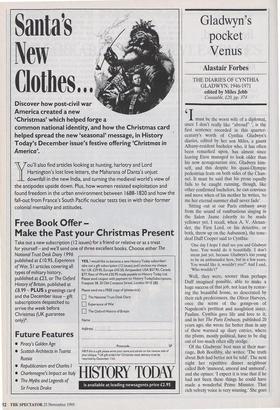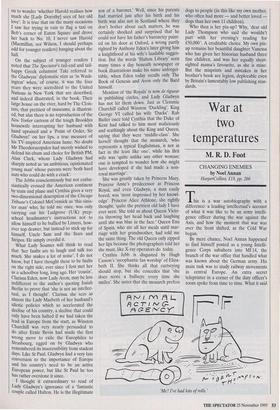Gladwyn's pocket Venus
Alastair Forbes
THE DIARIES OF CYNTHIA GLADWYN, 1946-1971 edited by Miles Jebb Constable, £20, pp. 374 Imust be the worst wife of a diplomat, since I don't really like "abroad" ', is the first sentence recorded in this quarter- century's worth of Cynthia Gladwyn's diaries, edited by her son Miles, a gaunt Albany-resident bachelor who, it has often been remarked upon, has almost since leaving Eton managed to look older than his now nonagenarian sire, Gladwyn him- self, and this despite his quasi-Olympic pedestrian feats on both sides of the Chan- nel. It must be said that his prose equally fails to be caught running, though, like other confirmed bachelors, he can convince and move when of his mother he writes, 'to me her eternal summer shall never fade'.
Sitting out at our Paris embassy away from the sound of rumbustious singing in the Salon Jaune (shortly to be made yellower yet, I recall, when A. V. Alexan- der, the First Lord, or his detective, or both, threw up on the Aubusson), the tone- deaf Duff Cooper said to Cynthia: `One day I hope I shall see you and Gladwyn here. You would do it beautifully. I don't mean just yet, because Gladwyn's too young to be an ambassador here, but in a few years. You would like it, wouldn't you?' And I said, `Who wouldn't?'
Well, they were, sooner than perhaps Duff imagined possible, able to make a huge success of that job, not least by restor- ing the beautiful house, so desecrated by their rich predecessors, the Oliver Harveys, once the scene of the goings-on of Napoleon's prettiest and naughtiest sister, Pauline. Cynthia gave life and love to it, and in her The Paris Embassy, published 20 years ago, she wrote far better than in any of these warmed up diary entries, where the plums, mostly political, have to be dug out of too much often silly stodge.
Of the Gladwyns' best man at their mar- riage, Bob Boothby, she writes: 'The truth about Bob had better not be told'. The next night her repetitive dinner neighbour called Bob 'immoral, amoral and unmoral', and she opines: 'I expect it is true that if he had not been these things he could have made a wonderful Prime Minister. That rich velvety voice is very winning.' She goes on to wonder 'whether Harold realises how much she [Lady Dorothy] sees of her old love'. It is true that on the many occasions I saw her trying in vain to flag a taxi on Bob's corner of Eaton Square and drove her back to No. 10, 1 never saw Harold (Macmillan, not Wilson, I should perhaps add for younger readers) hanging about the hall.
On the subject of younger readers I noted that The Spectator's tail-end and tail- happy Greek columnist Taki referred to the Gladwyns' diplomatic stint as 'in Wash- ington' when, of course, it was the four years they were accredited to the United Nations in New York that are described, and indeed illustrated, in the book. Their large house on the river, hard by The Clois- ters, that prettiest of museums, is illustrat- ed, but alas there is no reproduction of the New Yorker cartoon of the tough Brooklyn housewife interrupting her husband with hand upraised and a 'Point of Order, Sir Gladwyn!' on her lips, a true measure of his TV-inspired American fame. No doubt Mr Theodoracopulos had merely wished to defend his chum and choice for British PM, Alan Clark, whom Lady Gladwyn had sharply noted as 'an ambitious, opinionated young man' whose parents were 'both hard nuts who could do with a crack'.
The Jebbs conscientiously but not enthu- siastically crossed the American continent by train and plane and Cynthia gives a very two-dimensional description of the Chicago Tribune's Colonel McCormick as 'this sinis- ter man' who, he told me once, was only carrying out his Ludgrove (UK) prep- school headmaster's instructions not to allow himself to be bullied by Limeys, how- ever top drawer, but instead to stick up for himself, Uncle Sam and the Stars and Stripes. He simply overdid it. What Lady Soames will think to read that 'her faults are to laugh and talk too much. She makes a lot of noise', I do not know, but I have thought these to be faults on the right side, ever since I first met her as a schoolboy long, long ago. Her 'cousin', Clarissa Eden, now Lady Avon, may be less indifferent to the author's quoting Isaiah Berlin to prove that 'she is not an intellec- tual, as I thought'. Clarissa she sees as almost the Lady Macbeth of her husband's idiotic policies which so accelerated the decline of his country, a decline that could only have been halted if we had taken the lead in Europe from the start, as Winston Churchill was very nearly persuaded to do after Ernie Sevin had made the first wrong move to exile the Europhiles to Strasbourg, egged on by Gladwyn who remembered its inaccessibility from student days. Like St Paul, Gladwyn had a very late conversion to the importance of Europe and his country's need to be an active European power, but like St Paul he too has rather overdone it since.
I thought it extraordinary to read of Lady Gladwyn's ignorance of a 'fantastic couple called Hulton. He is the illegitimate son of a baronet.' Well, since his parents had married just after his birth and his birth was alas not in Scotland where they don't bother about such matters, he was certainly shocked and surprised that he could not have his father's baronetcy paint- ed on his door at Oxford, a wrong partly righted by Anthony Eden's later giving him a knighthood at his wife's laudable sugges- tion. But the words 'Hutton Library' seen many times a day beneath newspaper or book illustrations make his name unforget- table, when Eden today recalls only The Book of Genesis and Avon only the Bard himself.
Mention of 'the Royals' is now de rigueur in publishing circles, and Lady Gladwyn has not let them down. Just as Clemmie Churchill called Winston 'Duckling', King George VI called his wife 'Ducks'. Rab Butler once told Cynthia that the Duke of Kent had talked to him most maliciously and scathingly about the King and Queen, saying that they were 'middle-class'. She herself thought that the monarch, 'who represents a typical Englishman, is not in fact in the least like one', while his Brit wife was 'quite unlike any other woman; one is tempted to wonder how she might have developed if she had made a non- royal marriage'. She was greatly taken by Princess Mary, Princess Anne's predecessor as Princess Royal, and even Gladwyn, a man easily bored, was 'most impressed by her knowl- edge'. Princess Alice Athlone, she rightly thought, 'quite the prettiest old lady I have ever seen. She told us about Queen Victo- ria throwing her head back and laughing until she was blue in the face.' Queen Ena of Spain, who ate all her meals until mar- riage with her grandmother, had told me the same thing. The old Queen only zipped her lips because the photographers told her she must, like X-ray operators do today.
Cynthia Jebb is disgusted by Hugh Casson's 'sycophantic fan worship' of Eliza- beth II. She thinks all that curtseying should stop, but she concedes that 'she does score a bullseye every time she smiles'. She notes that the monarch prefers dogs to people (in this like my own mother, who often had more — and better loved dogs than her own 11 children). Who then is her pin-up? Why, 'dear old Lady Thompson who said she wouldn't part with her evening's reading for £50,000'. A creditable choice. My own pin- up remains her beautiful daughter Vanessa who has given her historian husband three fine children, and was her equally short- sighted mama's favourite, as she is mine. But the misprints and mistakes in her brother's book are legion, deplorable even by Britain's lamentably low publishing stan- dards.



















































































 Previous page
Previous page